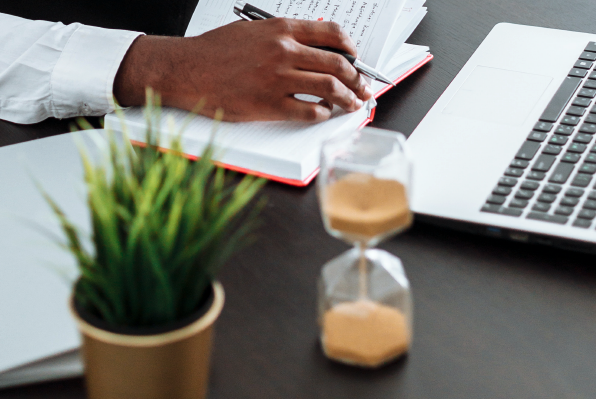The average human spends almost half of their waking hours thinking about something other than what is actually happening, according to a Harvard University study.
HOW IT HELPS.
Mindfulness is paying attention to the present moment, intending to be curious and nonjudgmental about what you’re paying attention to. As a lawyer, it’s actually your job to think about past events and future events during many moments. You can work mindfully of course, but it’s impossible and impractical to keep your thoughts glued to what’s happening in the current moment at all moments. Still as humans, our brains form habits without our awareness.
Practicing mindfulness helps us control how we spend our time and attention. If you want to improve any area of your life, mindfulness will probably help. There’s no shortage of benefits from work quality to physical health, including anxiety. We’ve all done things mindlessly — drove on autopilot, over-scrolled on social media. It doesn’t feel good, but mindfulness offers a powerful tool to help us feel better.
Powerful ways in which mindfulness encourages peak performance are discussed in this article by Dana Brownlee published by Forbes. It discourages mental multitasking, counteracts “negative fantasies”, promotes active listening and engagement, and helps prevent burnout. Further, a recent meta-analysis showed practicing mindfulness increases prosocial behavior.
Practicing mindfulness can even help reduce implicit bias, as Brenda Fingold of Brown University’s Mindfulness Center highlighted for the audience at the launch of Mindfulness in Law Society (MILS) in January 2019. You can find more on that from UC Berkeley here, and more from law professor and mindfulness practitioner Rhonda V. Magee here, including her book The Inner Work of Racial Justice: Healing Ourselves and Transforming Our Communities Through Mindfulness. Every lawyer needs to take active steps to reduce their implicit biases. MILS is growing divisions and chapters across the country — find more on joining here.
Still, practicing mindfulness can prove to be a negative experience for some individuals. With all the hype surrounding legitimate help offered by mindfulness, it’s worth a quick pause to review a few potential concerns that we discussed further in this blog post. The bottom line is that you need to pay attention to your individual experience and adjust accordingly. Lawyers, law students, and judges in Massachusetts can schedule a Free & Confidential appointment with one of our licensed therapists — find how here.
GETTING STARTED.
If you wait to start, you might not start. Recognize “the staying power of intention,” and be realistic about why and how you will practice. Pick at least one way to practice when you’re done reading — or pause as you read to practice. In all its glorious simplicity, mindfulness can appear overwhelming in a culture that simultaneously hypes its efficacy and seeks to distract us more. The good news is that no matter how long you’ve gone without practicing mindfulness, you’ll feel better when you start.
Find a 3-step Mindful Check here from Brown University’s Mindfulness Center. And find more on the four tips Brenda offers in Navigating the Full Catastrophe with Mindfulness published in the July 2020 edition of Trial Magazine:
- Practice being in the present moment;
- Cultivate the attitude of mindfulness;
- Check in with yourself regularly; and
- Embrace pleasant moments.
And mark your calendar now for Mindful Mondays! Each Monday at 3pm, MILS hosts a free 30-minute “virtual sit” online via Zoom. Here’s more. You don’t have to join MILS to join Mindful Mondays.
OBSERVING THE MOMENT.
Taking a moment to focus on the experience of one or more of your physical senses can allow your mind to vacate the unknown future and appreciate the present moment. What can you see, hear, smell, taste, and feel? By doing so, anxious feelings will decrease for as long as you are focusing on the present moment.
Focusing on something as easy as breathing is not so easy but does get easier. Every time you get distracted, you can refocus. And every time you refocus, you’ll improve your focus endurance. Every time.
5 Ways to Practice Mindfulness by Noticing:
- Notice your breath. Feel the air enter and move through you. Each time your mind wanders, return to the sensations of your breathing. Practice conscious deep breathing.
- Practice mindful eating. Pay attention to the tastes, sights, textures, smells, and sounds of your food. Don’t inhale your food for energy just to jump back into work, experience and enjoy your food.
- Notice your well-traveled route or usual environment. Pay attention to the details that you normally ignore. Scan your environment and choose which of the sights, smells, and sounds you want to focus on.
- Notice sounds. Pay attention when you hear sound mixtures around you and listen long enough to isolate and focus on individual elements of the sounds in the mix.
- Do full body scans or stretching. Pay attention to your body, processing areas from bottom-up or top-down, notice pain or tension and relax muscles as you proceed. Or, schedule at least one time each day to stretch, and notice the physical feeling prior to, during, and after stretching.
TIP: Anchor your Activity! For easier habit forming, incorporate your mindfulness practice into your day by tying it to a must-do. When you step outside for the first time each day, focus on something you see or hear. When you enter your car, do a full body scan before driving. When you walk to the bathroom, notice your muscles as you move. Commit (at least!) one meal or snack each to focus on eating it mindfully.
Find a couple other 5-minute mindfulness exercises here, including pendulation and grounding. You can also find a 4-Minute, 3-Step Morning Meditation from Rebekah Borucki here — it works any time of day for a fresh reset!
RESPONDING TO THE MOMENT.
One goal of mindfulness is to have better awareness and control of our emotions. As soon as you notice that you’re reacting to a stressor, use the STOP Practice, which Brenda shared at the MILS launch along with a list of personal stress warning signals. You can find a similar list here — concentrate on knowing yourself.
- STOP. Intentionally pause.
- Take a Breath. Take a slow, deep breath low into your belly (we know it really goes to your lungs) — or two, feeling it move through your body.
- Observe. What is happening to you right now? What body sensations can you feel? What emotions can you feel? What thoughts are entering your mind? What urges and behaviors are happening? Simply notice what’s happening without seeking to judge or fix.
- Proceed. Discern what is called for now from the direct experience of the moment. Acknowledge your feelings but disengage old thought patterns about them. Notice if by adding space for awareness, your experience is different than in the past and you feel more able to control your response.
Conversations often involve potential stressors. Practicing mindful conversations will help you stay in the present moment and also improve your relationships. Use these tips:
- Don’t try to multitask (trying to listen while also review a to-do list in your head does not work)
- Listen to the words that the other person is saying (this is hard; our brains process speech significantly faster than we speak)
- Notice the tone, volume, and intonation of those words
- Try to identify the emotions being expressed through those words
- Notice when you do not understand something and ask clarifying questions
- Paraphrase what you have heard and ask if it is accurate
- Reflect the emotions that you noticed and validate those emotions
- Share your thoughts in response
Related Reading:
Mindfulness-Based Stress Reduction for the Legal Profession (LCL MA Blog)
Related Programming:
NEW Starting January 7th, 2021! Mindfulness & Self-Compassion Tools for Legal Professionals: 4-Part Series – Thursdays, Jan. 7 – 28, 12pm – 1pm. Free & Confidential.
. . .
This post was compiled and updated from two earlier posts by Shawn Healy, Phd: How to Practice Mindfulness and Reduce Anxiety and Practice Mindfulness Amid the Chaos.




